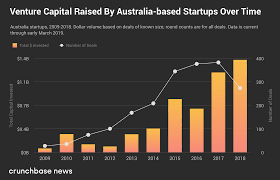How will COVID-19 affect venture?
01 Apr 2020 - News

How will the coronavirus crisis affect Australian venture capital?
That was a question put to four prominent venture fund managers on an Innovation Bay virtual panel on 25 March.
Their responses were both sanguine and cautiously optimistic. All four expected the recession to be caused by the pandemic to be protracted; probably worse for the venture sector than the 2000s tech wreck or the 2008 global financial crisis. They expected effects on venture funding to persist well after the economy picked up. But they agreed their firms were well resourced to keep funding their most promising investee companies and anticipated new opportunities would open up for many in the recovery. But they warned that start-ups would now find it very difficult to obtain funding and this was going to get worse before it got better.
The VCs were Paul Bassat of Square Peg Capital, Craig Blair of AirTree Ventures, Michelle Deaker of OneVentures and Rick Baker of Blackbird Ventures.
Moderator Ian Gardiner asked Bassat: what should start-ups be doing right now?
Bassat said founders should heed the message from Andy Grove of Intel on surviving massive change: “only the paranoid survive … and only the bold thrive”.
He said he believed the coronavirus crisis would prove the greatest healthcare crisis of our lifetimes and probably the greatest economic crisis of our times.
Start-up leaders needed to open and honest about the severity of the challenges they faced but should not panic. They needed to appreciate that right now cash is king. They needed to retain cash in their businesses and, when planning the route ahead, work to worst case scenarios. They needed to plan to survive so that when they came out the other side of the crisis their businesses would be in shape to take advantage of opportunities.
Blair was asked what he was doing to help investees.
He said he was primarily involved in triage. He was keeping in contact with companies and helping them identify their most important issues, first involving health and then business.
He said his experiences of surviving the early 2000s tech wreck as an entrepreneur and the aftermath of the global financial crisis as an investor encouraged him to be optimistic. But he warned that those crises had resulted from structural problems within economies so solutions could be identified. He doubted this would be possible in the aftermath of a global health crisis.
Effects of the crisis had already impacted on the venture sector, he said. Funding had declined 20 per cent in the first quarter of 2020. Corporate venture capital funds were no longer investing and private equity and hedge funds had retreated to their own asset classes.
Asked about angel investors, he said he was still seeing seed-round investment activity but some investors were sitting on their hands.
Deaker was asked what business sectors would be most affected by the crisis.
Tourism and travel, education and logistics had all already been severely affected, she said, but businesses in some sectors had been positively affected. These included all technology services that helped people work from home, online education, fulfilment services, delivery services, online exercise programs, telehealth and online media.
Businesses negatively impacted should not assume everything would return to the way it was once the crisis was over. When we come out of the crisis the world will be different and consumer behaviour will have changed in some sectors, she warned.
Baker was asked what lessons the venture capital sector should have learned from the last two economic crises.
He said it had been shown that private markets lagged public markets and while they might appear to fare better in the early stages of a crisis this would change. Founders would be ill-advised to expect funding conditions to improve, he warned, and any approaching a point at which they would need to raise capital should move now rather than waiting.
It will take time for the market to bottom, he said. After the collapse of Lehman Brothers ushered in the global financial crisis, venture capital markets continued to decline for a further four quarters and two quarters more passed before there was any improvement. In the tech wreck, the market took two years to reach the bottom and then three further quarters passed before there was any up-tick.
The good news in the present situation was that the Australian venture sector had enjoyed several years of good fundraising conditions and most funds had dry powder. But whereas a few months ago much of that would have been expected to be used for new investments now most of it would be retained to ensure current investee companies survived.
